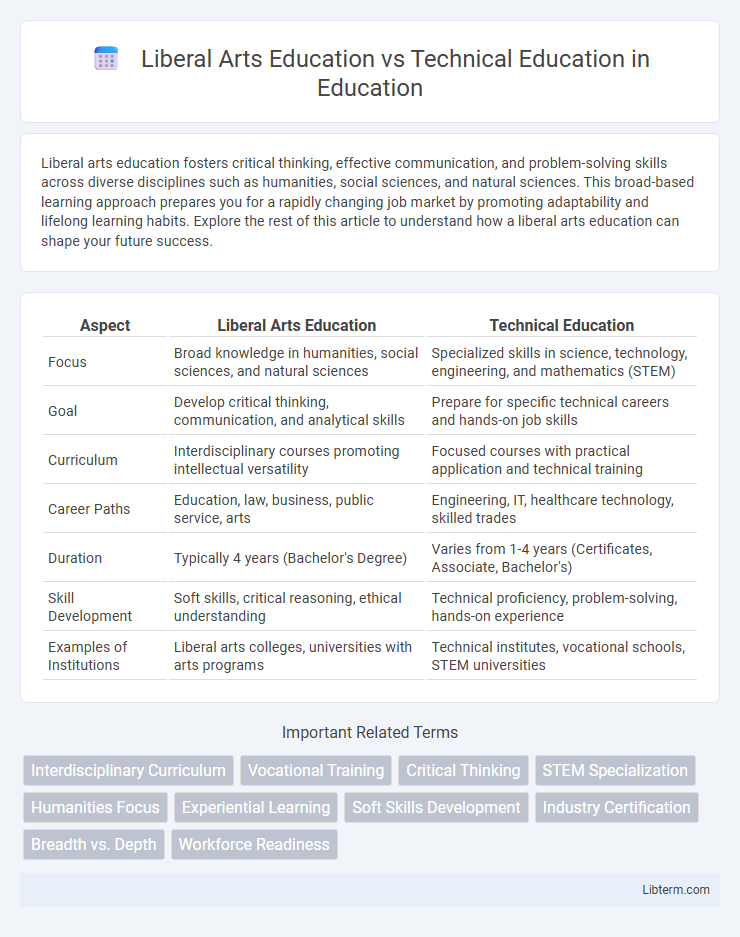Liberal arts education fosters critical thinking, effective communication, and problem-solving skills across diverse disciplines such as humanities, social sciences, and natural sciences. This broad-based learning approach prepares you for a rapidly changing job market by promoting adaptability and lifelong learning habits. Explore the rest of this article to understand how a liberal arts education can shape your future success.
Table of Comparison
| Aspect | Liberal Arts Education | Technical Education |
|---|---|---|
| Focus | Broad knowledge in humanities, social sciences, and natural sciences | Specialized skills in science, technology, engineering, and mathematics (STEM) |
| Goal | Develop critical thinking, communication, and analytical skills | Prepare for specific technical careers and hands-on job skills |
| Curriculum | Interdisciplinary courses promoting intellectual versatility | Focused courses with practical application and technical training |
| Career Paths | Education, law, business, public service, arts | Engineering, IT, healthcare technology, skilled trades |
| Duration | Typically 4 years (Bachelor's Degree) | Varies from 1-4 years (Certificates, Associate, Bachelor's) |
| Skill Development | Soft skills, critical reasoning, ethical understanding | Technical proficiency, problem-solving, hands-on experience |
| Examples of Institutions | Liberal arts colleges, universities with arts programs | Technical institutes, vocational schools, STEM universities |
Introduction to Liberal Arts and Technical Education
Liberal Arts Education emphasizes broad knowledge across humanities, social sciences, natural sciences, and arts, fostering critical thinking, communication skills, and ethical reasoning. Technical Education centers on specialized training and practical skills in fields like engineering, information technology, and applied sciences, preparing students for specific careers. Both educational paths offer distinct advantages, with liberal arts promoting adaptability and innovation, while technical education focuses on expertise and immediate workforce readiness.
Core Philosophy and Objectives
Liberal arts education emphasizes critical thinking, ethical reasoning, and broad intellectual development aimed at fostering well-rounded individuals capable of adapting to diverse fields. In contrast, technical education prioritizes practical skills, specialized knowledge, and applied problem-solving to prepare students for specific careers in science, technology, engineering, and mathematics. Both approaches share the objective of equipping learners with competencies essential for personal growth and professional success, but they differ fundamentally in their core philosophical focus on breadth versus depth of knowledge.
Curriculum Structure and Content
Liberal arts education emphasizes a broad curriculum that includes humanities, social sciences, and natural sciences to foster critical thinking, communication, and analytical skills. Technical education focuses on specialized coursework in fields such as engineering, computer science, and applied sciences, providing practical skills and in-depth knowledge required for specific careers. Curriculum content in liberal arts promotes interdisciplinary learning, while technical education prioritizes hands-on training and industry-relevant competencies.
Skill Development: Broad vs Specialized
Liberal arts education emphasizes broad skill development including critical thinking, communication, and problem-solving applicable across diverse fields. Technical education focuses on specialized skills tailored to specific industries such as engineering, information technology, or healthcare. This specialization enhances immediate job readiness, while liberal arts fosters adaptability in rapidly changing professional environments.
Career Opportunities and Outcomes
Liberal arts education cultivates critical thinking, communication, and adaptability, which are highly valued in careers such as marketing, education, and public relations. Technical education provides specialized skills and hands-on experience directly applicable to fields like engineering, IT, and healthcare, often leading to higher initial employment rates and salaries. Career outcomes for technical education tend to favor rapid job placement, while liberal arts graduates benefit from versatile skill sets that support long-term career growth and leadership roles.
Adaptability in a Changing Job Market
Liberal arts education fosters critical thinking, creativity, and broad problem-solving skills, enabling graduates to adapt quickly to diverse industries and evolving job roles. Technical education offers specialized expertise and practical skills, providing immediate employability but may require reskilling as technology and market demands shift. Combining interdisciplinary knowledge from liberal arts with technical proficiency enhances adaptability, preparing professionals to navigate and thrive in the dynamic, technology-driven job market.
Employer Perspectives and Industry Demand
Employers increasingly value liberal arts education for fostering critical thinking, creativity, and communication skills essential in dynamic market environments. Technical education graduates provide specialized expertise in fields like engineering, IT, and healthcare, meeting immediate industry demands for skilled labor. The integration of both educational approaches is gaining traction, as organizations seek versatile employees who combine technical proficiency with adaptable problem-solving abilities.
Critical Thinking vs Technical Proficiency
Liberal arts education emphasizes critical thinking, fostering analytical reasoning, creativity, and effective communication skills essential for problem-solving across diverse fields. Technical education prioritizes technical proficiency, providing specialized skills and practical knowledge necessary for mastery in specific industries such as engineering, computer science, or healthcare. Balancing both critical thinking and technical expertise can significantly enhance adaptability and innovation in the evolving job market.
Long-Term Professional Growth
Liberal arts education fosters critical thinking, communication, and adaptability, which are essential for long-term professional growth in a rapidly evolving job market. Technical education provides specialized skills and practical knowledge that enable immediate employability and expertise in specific industries. Combining both education types often yields the most sustainable career development by blending foundational soft skills with technical proficiency.
Choosing the Right Path: Factors to Consider
Choosing between liberal arts education and technical education depends on individual career goals, learning style, and job market trends. Liberal arts programs emphasize critical thinking, communication, and interdisciplinary knowledge, ideal for careers requiring adaptability and creativity. Technical education focuses on specialized skills and practical training, offering direct pathways to industries like engineering, IT, and healthcare.
Liberal Arts Education Infographic

 libterm.com
libterm.com